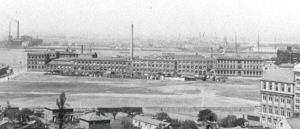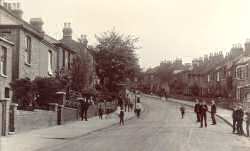Contents
- Before Development: A Place of Little Consequence
- Burrage Town: The First Estate in Plumstead
- Herbert Estate: Development on the High Slopes of Shooters Hill
- Plumstead Park Estate and the Saving of Plumstead Common
- The Plumstead Common Riots, 1876
- Bostall Estate, Abbey Wood
- Suburban Necessities: Churches, Schools, Shops and Public Houses
Plumstead: A 19th suburb of Woolwich's industrial and military might
by Barbara Ludlow
Plumstead Park Estate and the Saving of Plumstead Common
In the second half of the nineteenth century Plumstead was fast becoming one huge building site. As the Burrage and Herbert estates took shape in Western Plumstead so all the land belonging to Park Farm was cleared in the east.
Industry in Woolwich continued to expand, spurred on in particular by the Crimean War. The Armstrong Gun Factory, new cartridge and gun carriage factories were built on reclaimed Plumstead marshland. In 1843 a new entrance to the Royal Arsenal was built on the Plumstead Road and became known as the Plumstead gate.
Siemens Brothers opened their electrical and cable factory on the Charlton/ Woolwich boundary beside the Thames in 1863.
This factory would employ hundreds of workers as the century progressed.
In 1859 Plumstead Station was opened in Plumstead Road almost opposite the Plumstead Gate. This station linked Plumstead residents with other industries along the Thames as well as the centre of London.
Straight roads crisscrossed each other as the builders moved into eastern Plumstead. Vicarage Road and Park Road adjoined Burrage Town and other roads such as Brewery Road, Lakedale, Riverdale, Rippolson and Purrett Roads created a solid mass of housing from west to east.
Streets in the last great stage of building were created between about 1870 and 1910. In the twenty years between 1871 and 1891 Plumstead’s population grew from 28,318 to 52,754. The small Kentish village of 1801 had mushroomed into a heavily populated London suburb.
There remained one large piece of land which the owners, but virtually no-one else, thought suitable for development. Queens College, Oxford was the owner and the land on which they had planned to build a luxury estate was Plumstead Common.

